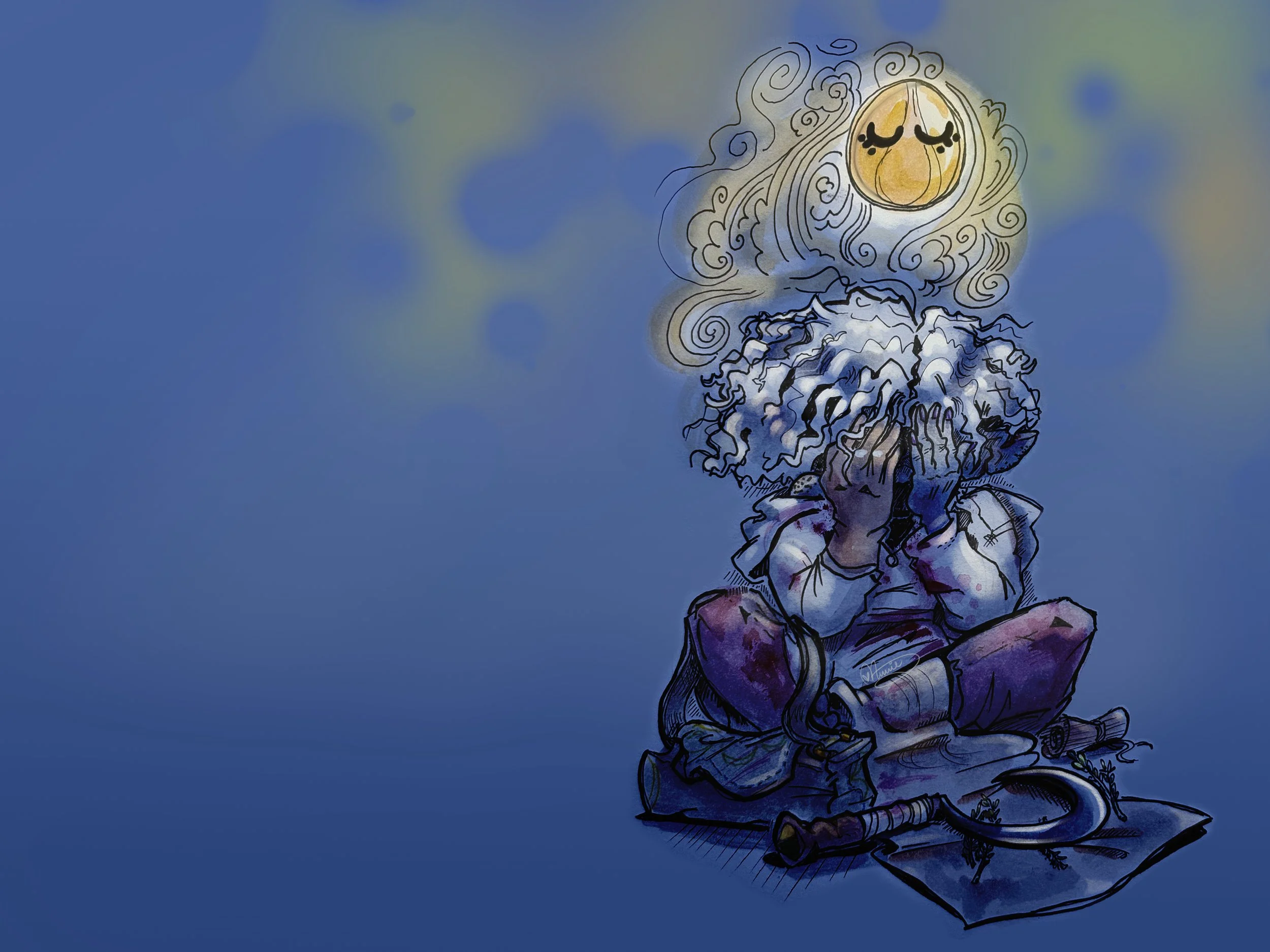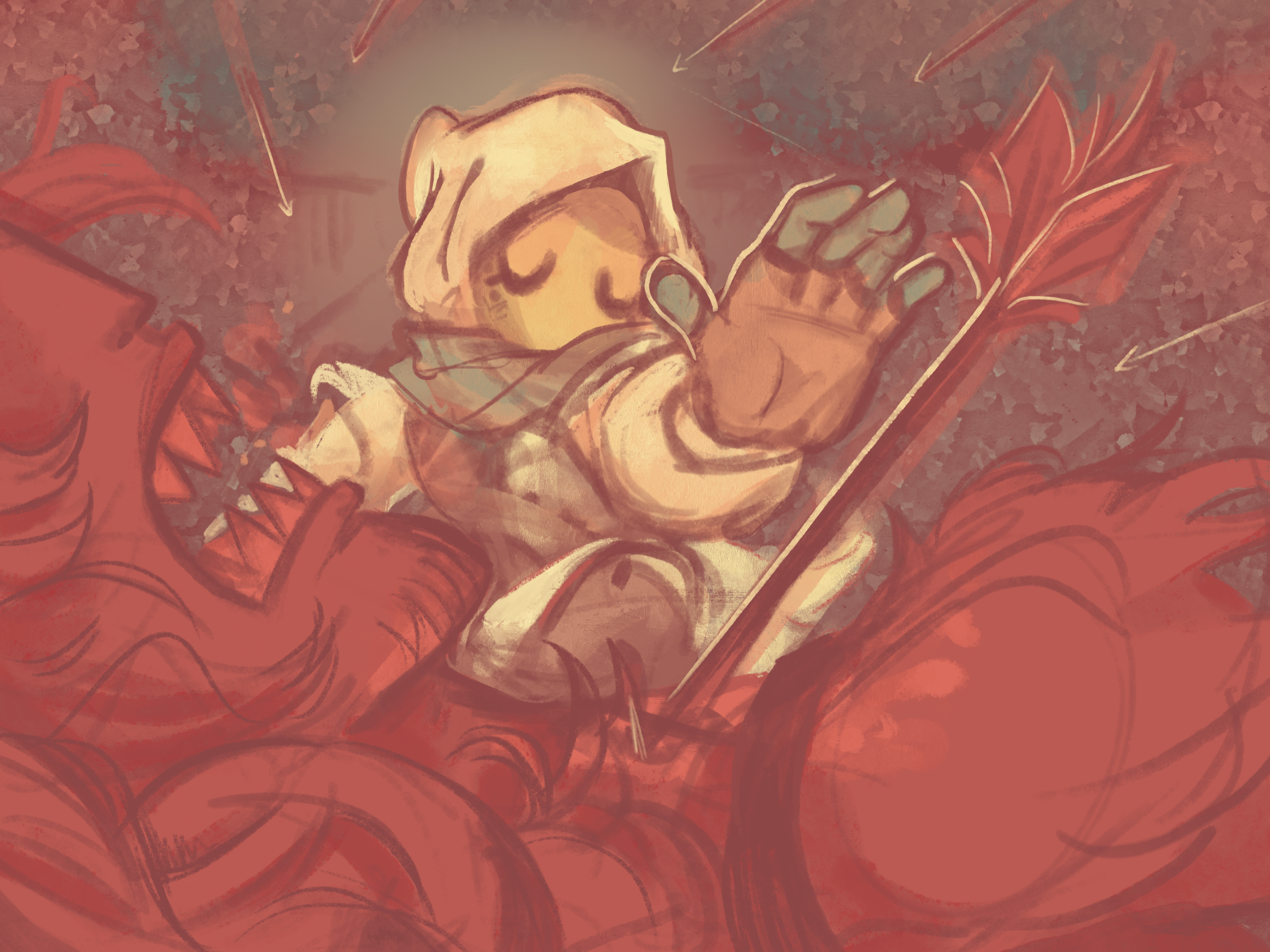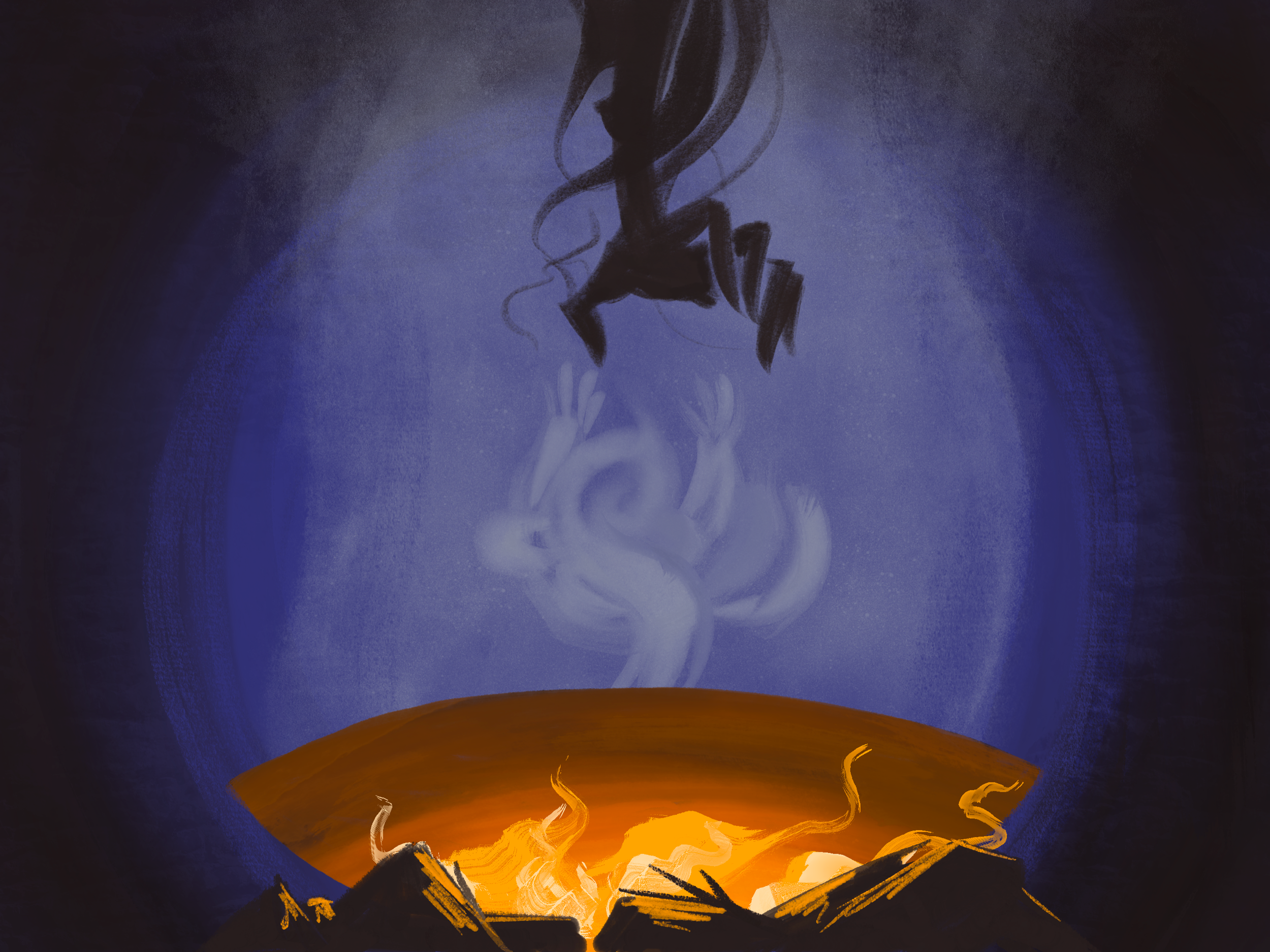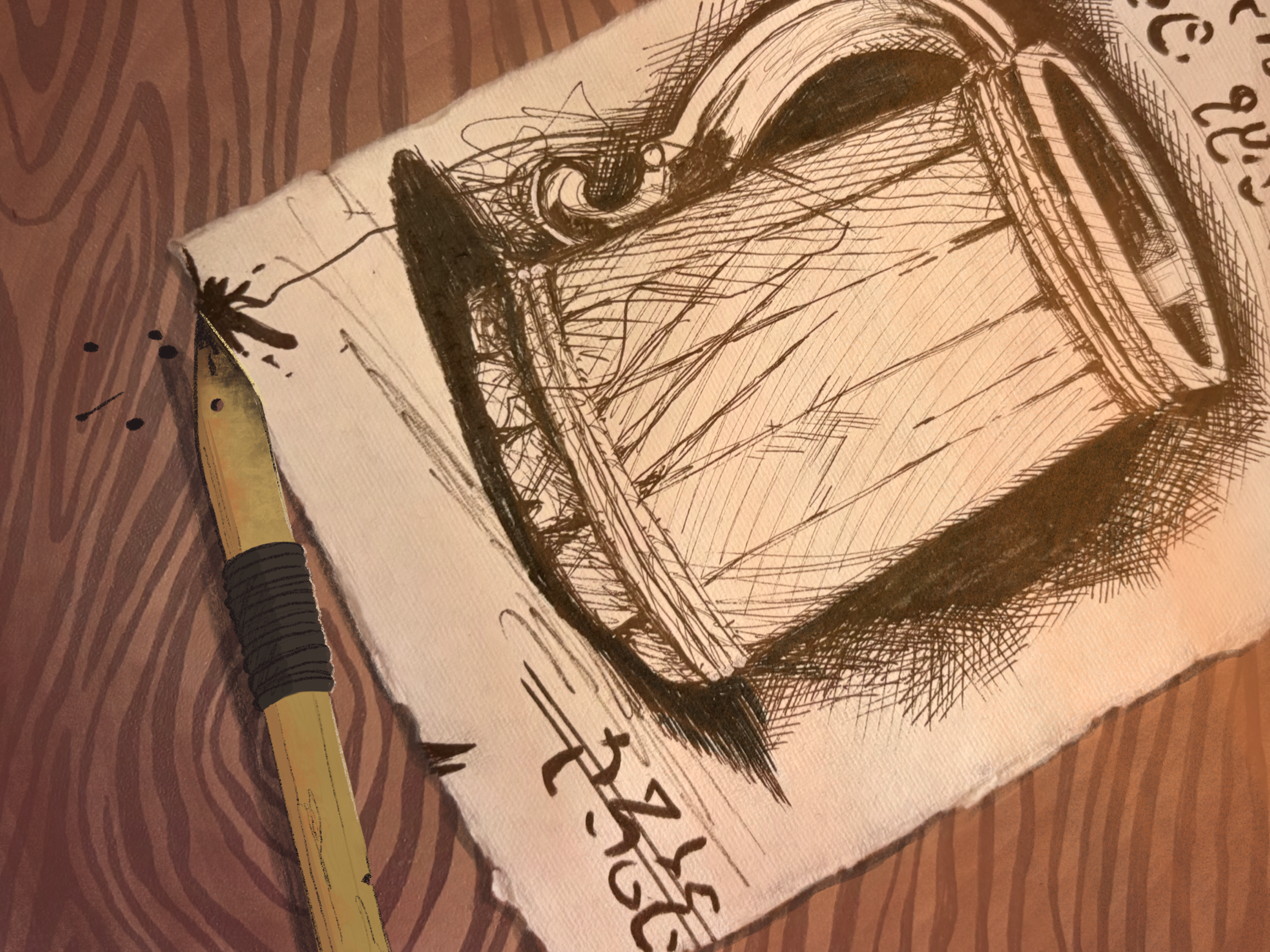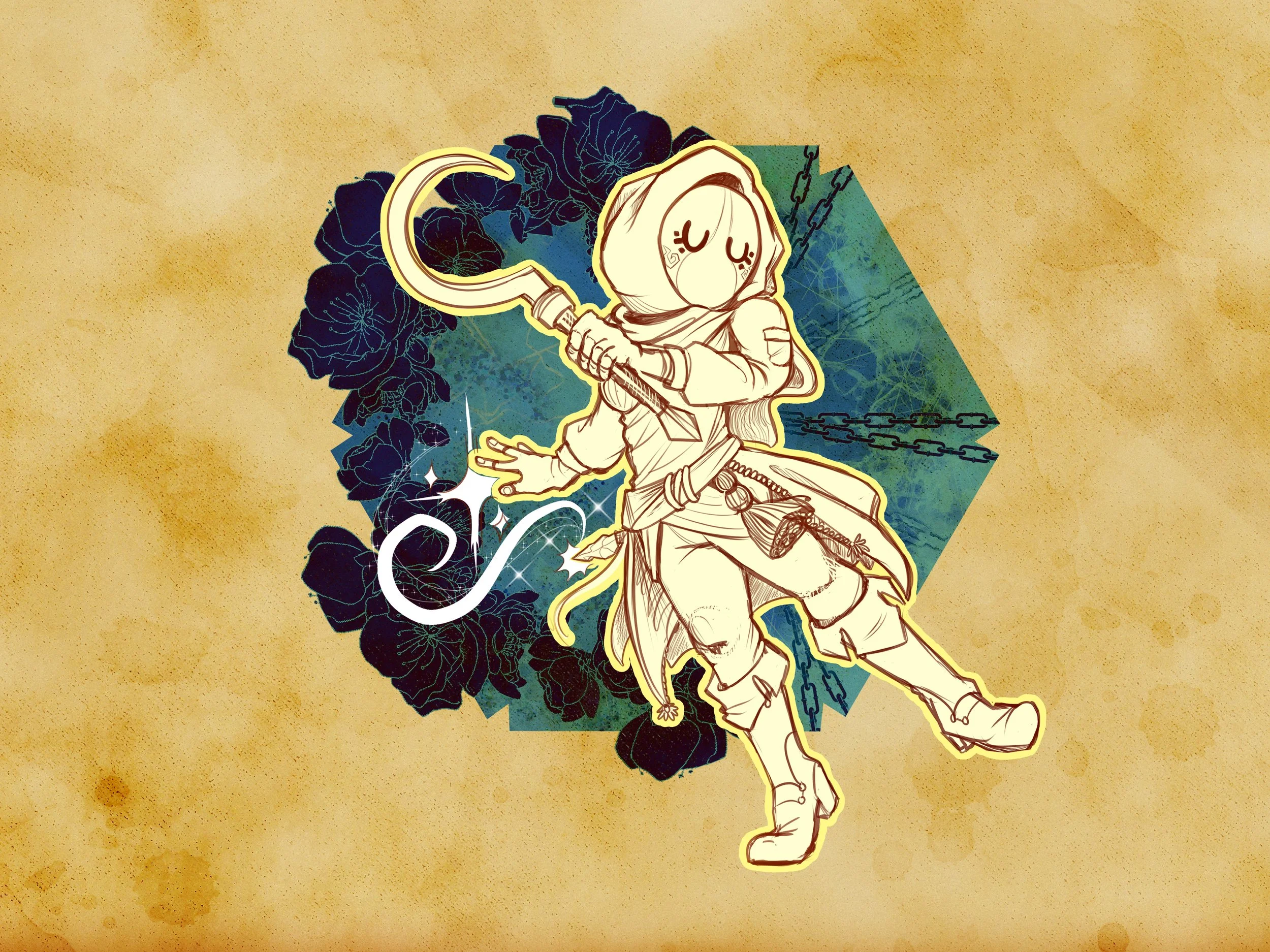Fanesca: Entry Six
Someone to shadow? Or to shine upon?
Sixth Entry
We arrived in Phandalin to witness a Finnegan regaling townsfolk with merriment, his tunic unwrinkled and spotless, his smile effortless and full. A man absolutely untouched by the hell we’d just survived.
I blinked at the sight. Then nodded, slowly. It confirmed what I had theorized— that wasn’t our Finnegan Wraithwood at the castle. Some mimic, some doppelgänger, had donned his visage, stepped into his voice, and manipulated us. Uncanny. Terrifying. How common of an occurrence was this? Will we ever face something like it again?
But before I could ponder further, I felt the shift.
The air grew sharp, tense. The rest saw him.
Ragar scoffed. Jack’s eyes narrowed, confused. But Raph’æl… he leapt from his seat with a fury I had never seen before, stomping towards the human wizard with the quiet wrath of something ancient and buried. I held my breath. Did he not realize? Or did he simply not care?
It did not matter in the end, as the moment he reached him—touching Finnegan’s shoulder and raising his fist with all the gentleness of a storm— something unexpected happened. The rage evaporated.
And they embraced.
That feeling stirred in me again. Not petty jealousy. Something deeper. Sharp, quiet, uncomfortable. A longing for what I saw in that hug: a balm for the soul that no spell could offer. No incantation, no ritual. Just trust. Love, in its truest platonic form.
Would I ever be worthy of such an amazing thing?
And if I were… did it really matter for someone trying to run toward a life of solitude?
As I began to climb down from the cart, I saw Raph’æl returning to it, his movements sluggish, heavy. He climbed back in and sat in silence, a dark shadow over his face that I had never seen before. He looked…so close to tears.
Super disappeared into a barrel by the general store. Ragar drifted toward the job board. Finnegan had already moved on to being in affluent conversation with the townmaster like he hadn’t missed a thing.
I looked around and realized no one else was going to check on him.
Except Jack. Jack saw. He moved his gaze from the cart to my mask, an understanding shared between us without gestures or words. He shouldn’t be alone.
I moved first, quiet and careful. Not because I feared Raph’æl, but because something about him in that moment felt fragile. Not breakable. Just… tender. Like a deep wound, still wet and pulsing beneath broken armor.
He didn’t look at me, but I could tell he knew I was there.
Then Jack climbed in—stomped in, really— rattling the whole cart and forcing me inches into the air, landing me onto the seat right next to the sullen cleric.
“Hey, Raph,” Jack said, sitting across from him. “You uh, doing alright there?”
Raph’æl looked between us. Eyes puffy. Jaw tight. Still upset but a gentle bewilderment starting to take over.
“I… it’s…” he stared and took a breath. “Y-your concern means more to me than you think,” he said with the faintest hint of a smile, then it faded quickly. “But I’m afraid that concern is wasted over the likes of me.”
They couldn’t see my face, but gods, I frowned to an almost painful degree.
“Why? How—?” I began to ask, but swallowed the rest of my question over fear of sounding judgmental.
I didn’t understand at the time why his sorrow ached so deeply in me. Why his brokenness stirred my own. So I privately defaulted to the most basic knowledge I could cling to: how could an Ilmatari be so downtrodden when they stand by a god that is said to have absorbed all their burdens? How could this person be so much less composed than… a godless, wandering ghost of a woman like me?
“It’s just—!” The words came fast and jagged. Raph’æl started one sentence, then another, each one collapsing before it got anywhere. Finally, he slumped back against the wooden cart wall. His hands gripped at the fabric of his robes, trying to anchor himself.
“I made so many of the decisions last night,” he finally said, voice cracking. “I took over the conversation. The bargaining. I was the one who pushed to split the party. I practically led us into a suicide mission. Every call I made was the wrong one, and Syldithas almost died because of it—!”
“But he didn’t!”
I said it faster than I meant to. I think I was afraid of where he was taking himself. Afraid that if someone didn’t stop the spiral, he’d get stuck there.
He turned toward me slightly, though he didn’t speak. Just… listened. His ears flicked, like they were searching for the next sound before his heart could brace for it. His gaze terrified me. Not his fault. Anyone’s rapt attention would have had me paralyzed.
“You’re the reason he’s still alive,” I said, quieter now. Sheepish. “You protected him. You protected all of us.”
He didn’t answer. I could see his eyes moving, like they were scanning for a hole in my reasoning—anything that could prove me wrong. I recognized that. That need to hold onto guilt because it feels like the only thing you can control.
“In fact…” I swallowed. “A lot of what happened… fell on me.”
I couldn’t say any more after that. It hurt. Those very thoughts had been growing heavier in my heart with each hour of our return trip. I had so many chances to help and I didn’t take them. I could have healed more than just one person. I could’ve bought us time. I didn’t. My magic has cracked cliffsides before. My fear had survived worse. And yet I’d stood there in that castle like I was still back in the ritual grounds—cowering. Being moved, rather than moving.
Jack groaned softly. “Look, you two…” he said, rubbing the back of his neck. “This isn’t how we fix it. You’re talking about hundreds of moving parts, dozens of things no one could’ve predicted—”
“I should have at least seen something beyond my own damn hubris!”
Raph’æl’s voice rang sharp and bitter in the cart, loud enough that I flinched. Not out of fear—just… shock. I’d never heard him raise his voice before. His façade of calm had dropped completely, and what was underneath wasn’t a storm. It was sorrow. Guilt. Something so tightly wound it had nowhere left to go but out. His features twisted with frustration, eyes glistening. But for the first time, the weight in his eyes matched his expression. The soul I’d always sensed beneath his demeanor had come to the surface.
It may have not be a physical one like my own, but… he had been wearing a mask all along.
He wiped at his face with his sleeve, likely embarrassed. “I’m sorry,” he mumbled. “It’s just… been difficult. For a while now. And I—I need to be honest with you.”
He looked at Jack first. Then at me.
“I wear the robes. I say the words. But I’m not… officially part of the church anymore. I was excommunicated.”
A long, uneasy pause filled the cart.
He looked down as he said it, like the words still tasted like shame.
I sat with it. I didn’t know what I was supposed to say. I wasn’t even sure what it meant yet, at least in the grand scheme of things. But I knew the pain of being cast out by people who claimed to be a guiding light. I knew the shape of that scar.
And somehow… it made sense. Not because it was right or fair. But because I could finally see him clearly. He wasn’t the radiant, flawless cleric one would assume him to be. He wasn’t someone who always knew what to do.
He was… trying.
Just like me.
The quiet between us had started to settle into something almost comforting. A delicate, but steady understanding. Then, like a rock through a still pond, Finnegan’s voice burst in.
He bounded into the cart, radiating enthusiasm, as if none of us looked like we had narrowly escaped death some hours ago. Either he hadn’t picked up on the weight in the air, or he had and was trying to drag us out of it the only way he knew how: with a distraction.
“A grand opportunity awaits us!” he announced, practically glowing. “The townmaster says something strange is going on in Tresendar Manor. Voices. Movement in the cellar.” He empathized his words with dramatic gestures. What a character. “Could be ghosts—could be squatters—but The Adventurers League wants to buy the place and turn it into a guild. They need someone to clear it out first.”
At first, I just blinked. It was such a stark tonal shift that my mind had trouble adjusting. Then I watched Finnegan’s expression shift into something more earnest. When he said that one of the manor’s three floors would be turned into an orphanage, it all made sense.
Of course. Orphans! He spoke about them with a sort of radical reverence most people reserved for gods. It was a constant thread, an anchor in conversations. Maybe this was his way of putting something right. Maybe it wasn’t about the mission—it was about making a dent in the pain he saw around him. That, or he was just… an odd fellow.
The others seemed open to the idea, nodding, asking questions. Even Jack’s usual low mumble had a note of curiosity in it.
I stayed quiet.
Not because I was opposed to their interest, but because I couldn’t shake the gnawing thought: we were already moving on. Gundren was still in danger. Still somewhere in that crumbling ruin behind us. And here we were… planning the next thing. He’s the reason we met. The reason this party exists. That’s not just sentiment—it’s the spine of everything we’ve built so far.
But I didn’t say anything. I’d already spoken more than I usually dared to in a day. I had stepped into Raph’æl’s grief with open hands, and I didn’t know if I had the strength to do it again. Not yet.
Then Finnegan mentioned the reward. Not gold. Not a favor. Ownership.
Of the cleared cellar.
It would be Our cellar.
My heart skipped, and if my mask hadn’t been there, my expression would’ve betrayed me completely before them all. A wide-eyed, slack-jawed kind of awe I haven’t felt in years. Maybe ever.
Ours.
I don’t know what that word means for the others—maybe a base of operations. A headquarters. A symbol of success.
But for me? It would be the first place I’ve ever lived that wasn’t chosen for me. The first place not marked by chains or chants or locked doors. Something real. I’ve never had a home. Not in the way people mean when they say the word. I’ve had spaces. Hidden places. Cages that disguised themselves as sanctuaries. Never somewhere that was mine.
I stayed still in the cart, but something inside me leaned forward. Reached. Not out of greed, but out of conviction.
If we succeed… if this works… maybe I’ll finally have somewhere to be. Not just hide.
Maybe it’s selfish to dream of a home when we haven’t saved the person who brought us together. Maybe it’s foolish.
But if we do this right—if we’re careful—maybe it can be both: hopeful and just.
And if not?
Then maybe this is just another mask I’ll have to learn how to wear.
———
We traveled east on foot, passing alleys of cracked cobblestone and the odor of old indulgence. The Sleeping Giant tavern loomed like a rotted tooth—sour barley and bile clinging to the air even from across the road. I kept my mask turned forward, but… there was a strange pull. Maybe someday I’ll enter it, just to know what happens when people choose to fall apart in public. I’d want Jack with me, though. For safety.
Behind the tavern, the winding path led us to the bones of what was once called Tresendar Manor. A crumbling thing with sharp corners and long-forgotten pride. As the others talked about the strength of its foundations—how it might be rebuilt into something grand—I lingered at the edge of the group. Not out of fear. Just uncertainty. Places with history tend to remember who enters them.
A phrase was scrawled at the manor’s threshold in smudged charcoal: RemEmbEr the REdBrands. Jack scoffed with an amused smirk and muttered something. I didn’t ask. Seemed to be personal.
Raph’æl hesitated before the entrance. I saw it in the angle of his shoulders, the pause in his breath. He didn’t want to go in. And for once, I understood without needing to know why. He expressed his hesitance and Ragar, who had become attuned to his plight as well, placated him and peeled off to scout the upper level for squatters. I walked the perimeter instead, trying to peer through windowpanes so thick with grime they reflected my mask back at me like a stranger. Before I could get too far, Finnegan waved me back—they’d already decided we would enter through the front.
The air inside was dense, as though the house hadn’t exhaled in decades. Every step echoed louder than it should have. Finnegan stepped forward and opened the nearest door, leading us into a new room. Unlike the rest of the manor, it was… preserved. Clean, somehow. Untouched by rot. He pulled out his tome and began to cast some form of dowsing I was unfamiliar with. The craft of a wizard is so incredible. I tried to stand close enough to see, but my height failed me. Damn my gnomish reach.
While he worked, I studied the contrast around us. Surface luxury has always felt excessive to me—lace for the sake of lace, velvet in places no one would ever touch. In the Underdark, a room with bioluminescence carved upon its walls was considered upscale. Luxury could be beautiful, but was always tied to function. Here, it seems to be illusion of comfort.
Then I stepped forward.
A creak beneath my foot made me pause—until I realized I wasn’t moving anymore, and yet… the groan continued. It was long and slow and strangely organic, like the beginning of a crone’s laugh. No one else reacted at first, and that’s when I knew: it wasn’t the floor. It was me. Or rather, it was in me. The sound in my mind split into a horrifically delighted gasp, then words:
“What are you thinking…?”
“What would you tell me?”
I turned toward the others and saw that I wasn’t alone in this. As unbothered as she tried to appear, Ragar’s fur was clearly bristled. Her hand was at her dagger’s hilt. Jack’s eyes scanned the ceiling as if he was daring it to speak again. Raph’æl looked just about ready to bolt or break. If he bit down on his lip any further, he’d draw blood. Super’s eyes had lost their anchor again. And Finnegan—Finnegan closed his tome with a flourish, as if nothing had happened at all.
“Presto! I’ve discovered the problem,” he announced, stepping out of the room like a performer called back for an encore.
Ragar followed him, sharp-eyed. “The problem? Care to enlighten us?”
The rest of us trailed after them. Rushing out of the house and towards a pair of cellar doors, they opened to reveal a walkway into the basement.
“This way,” Finnegan urged. “I think the real source is beneath us.”
The rest of us looked at one another. Source. There really was more to this than just intruders, wasn’t there?
He led us to a stairwell that moaned in protest as we descended. The air grew colder.
At the base of the steps, we were met with something I had no language for; an underground pool, clear and still and unnaturally perfect. Its edges were too precise, the glow too dreamlike. I barely had time to take it in before Ragar was shoulder-deep in it, chasing whatever glinted at the bottom like a child prying coins from a Neverwinter fountain. I turned away.
It wasn’t disapproval, exactly. Or maybe it was. For all my rejection of The Messengers and their endless senseless doctrines, I still feel… something, when I see the unknown being disturbed. A superstitious ache, a fear of consequence.
Strange, considering what I would do only moments later.
My eyes fell on an archway—wide, doorless, and centered in my vision as though it had been waiting for me. Without a word, I drifted through it, the voices of my comrades fading into whispers behind me. The hall beyond was narrow and damp, and I welcomed the weight of it. The scent of old stone, the softness of silence… it reminded me of the spaces between the horror. The passages where no one looked at me. No one touched me. Where the pain paused and I was allowed, just briefly, to exist.
That’s what this felt like. Not peace, exactly, but the memory of it. The cleared ritual chambers, the long walks back to bed with my little lamp flickering like a second heartbeat in the dark. Those moments of stillness were the closest thing I had to safety.
How foolish it is, to feel nostalgic for a cage just because it was quiet.
I kept walking. The stone beneath me creaked and whined, but I barely heard it. I was too focused on finding that voice again. The one that groaned to life earlier in my mind—too soft to be echo, too curious to be my own. It wasn’t asking for my attention. It was assuming I’d give it. I didn’t stop to wonder if it was beast, ghost, or something stranger. I only knew that it wanted to know me. And I wanted to know why.

